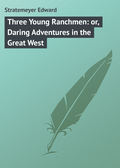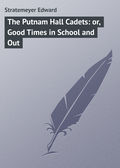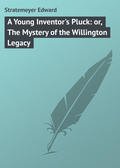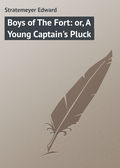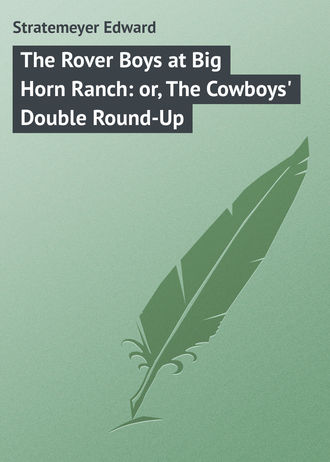
Stratemeyer Edward
The Rover Boys at Big Horn Ranch: or, The Cowboys' Double Round-Up
CHAPTER XXV
PROFESSOR DUKE’S SECRET
The girls had already returned from the woods and met Uncle Hans, as they called him.
“I got somet’ing by mine trunk in for you young ladies,” said Hans Mueller, with a broad smile. And later on when his trunk arrived he presented each of them with a bottle of the highest grade of olives. He also had some olives for Mrs. Powell, for use on the table.
“I import dem olives myself alreatty yet,” he vouchsafed. “Nopody by Chicago has olives half so goot.”
“I knew you’d be surprised to see Uncle Hans here,” declared Songbird Powell. “And I knew an outing on the ranch would do him a world of good. He has been confining himself too closely to business since he got back from the war.”
“It was grand of you, Uncle Hans, to fight for Uncle Sam,” declared Martha.
“And vhy, I like to know?” demanded Hans Mueller. “Since I come by der United States over I been just such a goot American like anypody.”
“That’s the way to talk, Uncle Hans!” cried Jack, and slapped him on the shoulder.
The next day the young folks took great pleasure in showing Hans Mueller around the place.
“He vas chust like a farm, only different,” remarked the delicatessen man. “Dot iss a nice lot of cows you got, Songpird. I dink dos cows vould make apout a million pounds of frankfurters, not?” and at this remark there was a general laugh.
A few days later Jack noticed that Songbird Powell seemed to be worried over something. The owner of Big Horn Ranch held an earnest consultation with Joe Jackson, and then the foreman of the ranch rode off in hot haste, accompanied by two of his cowboys.
“What’s the matter – is something wrong?” questioned Jack of Spouter.
“Four of our best horses are missing,” answered Spouter. “The men are not sure whether they strayed away or have been stolen. Jackson and the fellows with him are going to ride along the river and see if they can find out.”
“Didn’t you say something about other horses being stolen before we got here?”
“Yes. But they didn’t belong to my father. They belonged to the men who formerly owned this ranch. They left them here, but at their own risk.”
“Were the animals now missing the horses we rode?” questioned Fred.
“No. They were the mounts used by Jackson and his men. That is, three of the horses were. The other was that beautiful black my father occasionally rode.”
“You mean Blackbird?” exclaimed Randy.
“Yes.”
“Why, I think Blackbird is the finest horse on the ranch,” declared Gif.
“He certainly is a splendid nag,” answered Spouter. “And my dad thinks a great deal of him.”
The horse in question was a three-year-old, shining black in color, with a peculiar diamond-shaped spot of white on his forehead and a similar spot on his chest. Because of these spots some of the cowboys often referred to him as Two-spot.
“I suppose those horses are worth some money,” remarked Fred.
“Indeed they are!” declared Spouter. “I heard my father say he wouldn’t take four hundred dollars for Blackbird. And the other animals must be worth at least a hundred and fifty dollars apiece. You know they always had pretty good horses on this ranch.”
“I certainly hope they get some trace of the horses,” said Jack.
But this hope was not fulfilled. Jackson and those with him came back disappointed, saying that they had found no trace of the animals.
About a week later came another surprise. The young folks, including the girls, had gone off to the woods for the best part of the day, and when they returned, much to their astonishment, they saw seated in rocking chairs on the veranda Ruth and May.
“My goodness!” screamed Mary. “Ruth and May! Glory hallelujah! How in the world did you get here?”
“And you never let us know!” wailed Martha, as she bounced up the steps to embrace her school chums.
“We got started sooner than we expected,” answered May.
“Did you come alone?” questioned Jack, as he, too, came forward, his pleasure showing on his face.
“No, we didn’t come alone,” answered Ruth. “We came with Mr. and Mrs. Rover. They are inside with the others.”
“My mother and dad!” burst out Andy. “Where are they?” And he raced into the house, followed by his twin.
There followed a joyous reunion all around. Everybody was happy to see everybody else, and for a while it seemed as if all were trying to talk at once.
“We had a splendid trip over,” declared Mrs. Nellie Rover. “Not a single hitch all along the way. Tom had everything mapped out to the last detail.” And she gave her husband an affectionate glance.
“That’s what army discipline did for me,” answered Tom Rover. “I didn’t used to be so particular. But now I’ve got in the habit of walking a regular chalk mark.”
“Yes, I’ve walked me a chalk mark, too,” put in Hans Mueller. “I run mine delicatessen stores chust like they vas by army regulations alreatty. And it pays, belief me!”
“It’s a regular touch of old times to see you around, Hans,” said Tom, grabbing his former school chum by both arms. “How is that new pickling machine getting along?”
“Vot pickling machine you mean, Tom?” questioned Hans, looking at him blankly.
“Why, that machine you’re going to invent whereby you can grind up old oilcloth and automobile tires and make dill pickles of them.”
“I don’t vas got no machine like dot, Tom,” answered the delicatessen man in bewilderment. “I buy mine dill pickles by der barrel. Dem dill pickles grows, you can’t make ’em by no machine.”
“Oh! Then maybe it was a new sourkraut stamper,” went on Tom innocently.
“Oh, Tom, you vas joking chust like you alvays vas!” exclaimed Hans, a light breaking in on him. “Vell, I don’t care. You vas a pretty goot fellow anyhow,” and Hans smiled as broadly as ever.
“It sure is a touch of old times,” declared Songbird Powell. And then, unable to restrain himself, he burst out:
“From among the mountain tops
Where the brooklet flows,
There I love to linger long – ”
“Counting up my toes,”
broke in Tom, with a twinkle in his merry eyes.
“Counting up my toes!” snorted Songbird. “Nothing of the kind! You always did knock my poetry endways, Tom. That last line was to read like this:
“Where the sunset glows.”
The young folks had a grand time that evening singing and dancing, and did not retire until the older heads had hinted several times that they had better do so.
“Oh, Jack, it’s a splendid place to come to!” said Ruth, when she was on the point of retiring. “I know I’m going to have the best times ever.”
“And to think my Uncle John owns the place!” put in May. “Isn’t it simply glorious?”
After that the days seemed to speed along swiftly. The boys and girls made up various parties up and down the river, and on the hills and in the woods. Once they got up a grand family picnic, and everybody attended.
During those days the boys often wondered whether Brassy Bangs would show himself. But Brassy kept out of sight, and for the time being they heard nothing further concerning him. But they did hear through Joe Jackson of Bud Haddon. That man had been met on the trail to Bimbel’s ranch in company with several other persons.
“They were a bum-looking bunch,” declared Jackson. “I wouldn’t give one of ’em house room on this ranch.”
“Haddon certainly didn’t make a very good impression on me,” declared Jack. “I’m frank to admit I think he’s a thoroughly bad egg.”
From time to time the boys had been sending letters to some of their other school chums, and a number of letters had come in return. One day Gif received a long communication from Fatty Hendry which he read in wonder.
“Here’s something that will interest all of you,” he declared, after he had finished. “I guess it clears up the mystery surrounding Professor Duke.”
“What is it?” questioned Fred eagerly.
“It’s a letter from Fatty Hendry. He’s been staying at a place named Ellenvale, which, as you know, is about thirty miles north of Haven Point. He says that Snopper Duke came from that place, and has an aged father living there.”
“Has Duke been taking care of his father?” questioned Jack.
“Yes. And his father has been very sick and has had to have several operations. It seems the operations cost a lot of money, and Duke wanted two of his younger brothers to help pay for them. But they wouldn’t contribute a cent.”
“Gee, that was certainly rough!” declared Randy. “No wonder the professor was grouchy at times.”
“That isn’t all of it,” went on Gif. “Fatty got interested and made a little investigation, and he found out that there was another brother, a little older than the professor, who had gotten into difficulties with the firm he was working for. That firm was on the point of having him arrested, so Fatty heard, but at the last minute Professor Duke came forward and settled up for him, so he wasn’t prosecuted.
“But Fatty adds in his letter that he heard this not only took every cent the professor had, but it also placed him in debt to Colonel Colby and some of his friends.”
“Well, that’s what I call hard lines!” declared Jack emphatically. “The poor professor must have been worried half to death.”
“Does Fatty say anything further about Duke’s father?”
“Yes. Since the last operation the old gentleman is feeling quite like himself again.”
“And what became of the brother who got into trouble?” asked Spouter.
“He disappeared, and Fatty says there is a report that he went to England, where the family originally came from. I suppose Professor Duke was glad to have him go.”
After this Gif handed around the letter so that all might read it. After its perusal Andy was the first to speak.
“It’s too bad,” he said, with a deep sigh. “I’m mighty sorry now that I didn’t treat the professor with more consideration. That poor man certainly had as much of a load as anybody to carry.”
“We’ll have to make it up to him when we get back to Colby Hall,” declared Randy. “I’m going to show him just what I think of him,” he went on. “He certainly was a fine fellow to help his old father and to get his brother out of that hole.”
The boys were still discussing this matter when they suddenly saw Joe Jackson dash up to the ranch house on his horse and dismount in great haste.
“Hello, something is wrong!” declared Jack.
Songbird Powell and Tom and Sam Rover had seen the approach of the foreman, and men and boys ran out to listen to what he might have to say.
“Four more horses are gone!” declared Joe Jackson. “The best horses on the ranch! And, boss, I’m certain this time that they didn’t stray away. They were stolen!”
CHAPTER XXVI
THE CATTLE STAMPEDE
“Four more horses gone!” cried Songbird Powell in consternation. “When did this happen, Jackson?”
“Less than half an hour ago, over on the three-tree range,” returned the foreman.
“And what makes you certain that they were stolen this time?”
“Because the horses had been left all properly tethered. Billy Brown and his crowd had ’em, and I know Billy is a very careful man. He’s positive they couldn’t have broken away.”
“This is certainly getting to be a serious matter,” declared Sam Rover. “Songbird, if these last four horses were stolen, it’s more than probable that the first four went the same way.”
“Any clue to the thief or thieves?” asked Tom Rover.
“The boys looked around and picked up a quirt that they say don’t belong to our outfit. But it’s a very ordinary quirt and might belong to almost anybody. Of course, they found a good many hoof marks, but they were so mixed up with the marks from the other horses they couldn’t tell one from the other.”
“I’ll ride over to the place with you and investigate,” returned Songbird Powell after a moment’s thought. “Perhaps we can get on the trail of the thieves.”
“Can we go along?” questioned Spouter quickly.
“No, Son. We want to use the horses. And, anyway, I think it would be better for you lads to remain behind.”
Songbird and the foreman hurried down to the horse corral accompanied by Tom and Sam. And thus the boys and girls, as well as the ladies of the household, were left by themselves.
“Gee! I’d like to go on a chase after those horse thieves,” burst out Andy.
“You might get a pretty warm reception if you did that,” remarked Fred. “Horse thieves and cattle rustlers are usually a bad bunch.”
“It isn’t likely they’ll get on the trail of the horses very quickly,” put in Jack. “Those fellows have too much of a start. The most they can do is to advertise the loss as widely as possible and trust to it that some one will recognize the horses, especially Blackbird.”
The boys had spoken about going fishing, and Ruth and May had asked if they could go along. As a consequence the young folks spent the remainder of the afternoon along the river. They managed to catch a good mess of fish, of which they were justly proud.
“And just to think! I caught two of the fish myself!” exclaimed Ruth. “I never knew I was going to be a fisherman.”
“You mustn’t say ‘fisherman;’ you must say fisherlady,” put in Andy mischievously.
The men did not return until ten o’clock that night. All were tired and hungry and glad to sit down to the meal which Mrs. Powell and the cook provided.
“It was a wild-goose chase,” answered Tom Rover in reply to a question from Andy. “We followed half a dozen clues, but they didn’t get us anywhere.”
“What are you going to do next, Dad?” questioned Spouter.
“We sent word to Arrow Junction and several other places, and they’ll post notices giving a description of the stolen animals,” answered Songbird. “And I’ve offered a hundred dollars reward for any information leading to the recovery of the horses.”
The next day one of the cowboys came in with more information. This was to the effect that a ranch in that neighborhood, owned by a man named Cheltham, had suffered the loss of three horses, one a mare of considerable value.
“Say, this certainly is getting interesting,” said Jack, when the lads heard the older heads talking it over. “First thing we know, all the horses on the place will be gone.”
“Years ago they used to suffer from the cattle rustlers in this neighborhood,” said Spouter. “But horse stealing is something new.”
“I wonder if that fellow Bud Haddon had anything to do with it?” questioned Fred.
“I was thinking of that,” broke in Randy. “I think they ought to make an investigation.”
The boys spoke to the men about this, and there was a long discussion which ended when Songbird said he would ride over to the Bimbel ranch with his foreman and interview the men.
The visit to the Bimbel ranch occurred the next day, and the boys waited impatiently for the return of the two men to learn what Bimbel and Bud Haddon might have to say.
“Another wild-goose chase,” announced Songbird Powell, on the return that evening. “We saw Bimbel, and he seemed as much surprised as anybody to learn of the horses being taken.”
“And what about Bud Haddon?” asked Jack.
“We didn’t see Haddon. But Bimbel said he had been at the ranch house early in the morning and he was certain Haddon knew nothing about the loss. He said Haddon and the other men were out on a range to the westward, looking after the cattle. Of course, if Haddon was away out there he couldn’t have been here taking our horses.”
“And you didn’t see any trace of the animals?” asked Spouter.
“Nothing at all. They said they hadn’t heard of the theft nor of the loss of the horses over at Cheltham’s ranch.”
After that a week passed swiftly, during which time the young folks enjoyed themselves thoroughly, not only in tramping and riding around and in fishing, but also in other sports around the ranch home. With so much level ground available, a tennis court had been laid out, and also a croquet ground, and the boys and girls enjoyed these games immensely. The lads also pitched quoits, a sport which at times had been popular at Colby Hall.
One day the boys accompanied Joe Jackson on a round-up of some cattle far down the river. This was a day full of excitement, for some of the cattle broke away and Andy and Fred happened to be separated from the rest of the crowd and got directly in line with the runaway steers.
“Hi there! Hi there! Ride out of the way!” yelled Joe Jackson at the top of his lungs.
Andy and Fred were looking in the opposite direction and did not notice the cattle until the beasts were within a hundred yards of them. Then they heard the foreman’s cry and also the beating of the hoofs on the prairie.
“My gracious!” gasped Fred. “Look what’s coming!”
“We’ve got to get out of the way and be quick about it,” returned Andy, and struck his horse on the flank.
The steeds the boys were riding needed no urging, for the sudden rush of the cattle filled them with alarm. Away they bounded across the grassy plain with the maddened cattle thundering after them.
“Let’s ride to one side and let ’em pass!” gasped Fred, who was badly shaken by this sudden turn of affairs. He had not dreamed that the herd of cattle would head for them in this fashion.
But to get out of the way was not easy. To one side of the plains was a series of rough rocks, while to the other side there was a brook flowing into the river, and here the ground was soft and treacherous.
“Don’t go that way!” cried Andy, as he saw his cousin heading toward the brook. “You’ll get stuck and you’ll never get out.”
“I’d rather get stuck than be trampled under foot by those beasts,” panted Fred.
“No, no, Fred! Turn this way! I’m sure we can get up on the rocks somehow!” declared Andy.
The boys continued to advance with the thoroughly frightened cattle not far behind them. While being rounded up both cattle and cowboys had come upon a nest of small rattlesnakes. These had, of course, frightened the beasts, and they were still more frightened when the cowboys had begun to shoot at the reptiles. Then a few of the cattle had started the stampede, and the rest, terrorized by the pistol shots, had followed.
As the two lads galloped on, they looked anxiously to the side where the rocks were located. Most of the places they passed were too steep to ascend. But presently Andy caught sight of a point where there was something of a trail leading upward.
“Come on this way!” he yelled to his cousin. “I think we can get up on the rocks here!”
In the meanwhile Joe Jackson and his men, followed by Jack and the others, were doing their best to get the cattle to turn back to the point from which they had started. The best herd riders were circling the edge of the rushing animals, shouting at the top of their lungs and firing their pistols. But so far this demonstration had had little effect.
“Oh, Jack! do you think they’ll be run down?” gasped Randy.
“I hope not.”
“They’re on a pair of good horses; they ought to be able to outrun the cattle,” came from Gif.
“Don’t be so sure of that,” cried Spouter. “A mad steer can go some, believe me.”
“Who ever thought they would start off like that?” went on Randy.
“It was firing at those rattlesnakes did it,” declared Jack. “Of course, I can’t blame the cowboys for doing that.”
Andy and Fred found the rocks anything but easy to ascend. They went up a few feet, and then the horses began to slip and were in danger of rolling over, carrying their young riders with them.
“Look out!” screamed Fred. He had to catch his horse around the neck to keep from being flung headlong.
But the horses were as anxious to escape the maddened cattle as were the lads, and the steeds continued to scramble upward until they reached a ledge of rock where the footing was comparatively level.
“Do you think we’ll be all right here?” panted Fred, when he could catch his breath sufficiently to speak.
“We shall be unless some of those steers take it into their heads to climb the rocks the same way we did,” answered Andy. He was suffering from a slight bruise on his left leg where he had brushed some of the roughest of the rocks.
The horses were still alarmed, and continued to snort and stamp their feet, and the two lads for a few seconds had their hands full quieting the animals. They looked below them and saw the cattle coming on in a great mass. Some had already passed, but others were huddled close to the rocks as if on the point of making an ascent.
“I really think they’ll try to come up,” said Fred.
“Come ahead! We’ll see if we can’t get a little higher up,” answered Andy. “I don’t think the steers will follow us very far, even if they do come. We can shoot at them if we have to,” he added, for each of them carried a pistol.
Beyond the ledge were more rough rocks, and here the two lads had to proceed with caution for fear one of their horses might slip and perhaps break a leg. As they advanced they looked back and saw that the cowboys were coming closer and were beginning to drive a part of the cattle to the rear.
“Oh, if only they can drive them back!” sighed Fred. “Just look at ’em, Andy! There must be a hundred of the steers directly below us! And see how angry that big black fellow looks! He acts just as if he’d like to come up here and gore us!”
“Listen!” ejaculated Andy, pulling back on the rein. “What’s that funny noise?”
Both listened, and, mingled with the murmurs of the cattle at the foot of the rocks, came to their ears a peculiar whine or growl that was entirely new to the lads.
“It’s a wild animal of some kind!” cried Fred, as the growl was repeated.
“Where did it come from?”
“I don’t know. But it was close at hand.”
Thoroughly scared, both boys looked on all sides. Then, of a sudden, Fred let out another exclamation.
“There it is! Right on the shelf of rocks yonder! Oh, Andy, it’s a mountain lion!”



